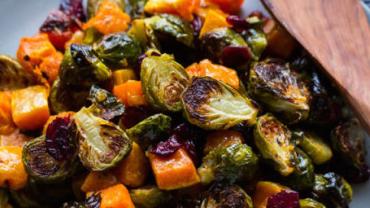
In recent generations Brussels sprouts seem to have lost their splendor as a culinary delight; more often evoking memories of the past rather than notions of health and nutrition. However these unappealing miniature cabbages are making a comeback among the health-conscious and for good reason! Brussels sprouts are a nutrient powerhouse. They possess a superior array of health-promoting phytonutrients which support the most essential processes of the body.
As a member of the Cruciferae (also known as Brassicaceae) family Brussels sprouts are part of a unique family of vegetables that also include kale broccoli cauliflower kohlrabi cabbage mustard and collard greens bok choy turnips rutabaga and others. This family of vegetables contains significant amounts of special compounds that contain sulfur. These compounds play a Jekyll and Hyde role though in that they are responsible for an unattractive sulfur smell which is repulsive to many when cooking cruciferous vegetables; and yet these compounds also possess attractive health benefits that no other vegetable can boast. Quite simply these pungent sulfur compounds are responsible for the health benefits provided by vegetables such as Brussels sprouts; and Brussels sprouts have been found to contain a higher amount of sulfur-containing compounds as compared to other cruciferous vegetables.
Cell Health
The action of chopping or chewing Brussels sprouts releases the powerful sulfur-containing compounds making them readily available within the body. Once absorbed these compounds begin working to support the various cycles of growth and replication of cells. Cell growth and replication are complicated processes that can easily be challenged by toxins infections and nutrient deficiencies. Ensuring these foundational processes are functioning appropriately is paramount to good health and wellness. The unique compounds found in Brussels sprouts are adept at supporting the growth and replication processes and therefore promoting good health at a foundational level.
Cleansing
Many health conditions can arise or become difficult to manage when the body is overloaded with an abundance of toxins. The liver is the primary organ responsible for the detoxification process. Here specialized enzymes work to neutralize and collect potential toxins before they have a chance to harm the body and these enzymes are supported by sulfur. Therefore Brussels sprouts may be extraordinarily helpful by supporting the body’s most basic detoxification pathways.
Inflammation
Brussels sprouts also offer the capacity to support healthy inflammatory pathways in the body. Inflammation is often an indicator of poor health and the ability to maintain a healthy inflammatory response can alter the course of one’s long term health. Brussels sprout’s ability to support normal inflammatory responses is due to various nutrients housed in this vegetable. The sulfur-containing compounds aforementioned play a powerful role which is shared by vitamin K and omega-3 fatty acids. Brussels sprouts may only contain a small amount of omega-3 fatty acids but every bit counts since omega-3s are renowned for their ability to support a normal inflammatory response by balancing fatty acids that are involved in the process’s pathways. Suboptimal functioning of these pathways is becoming a rising concern.
The supportive role nutrients in Brussels sprouts can play in so many foundational body processes makes it a particularly attractive vegetable. It is no wonder this vegetable has been a token of health for so many decades. It may not have such an attractive appearance or smell but with light cooking and a little seasoning these miniature cabbages can become as popular as any dearly loved dish. So let us usher in a revival of this nutrient powerhouse and make Brussels sprouts a regular addition to the diet.
Sources
Higdon J. (2005). Linus Pauling Institute: Micronutrient Information Center. Cruciferous Vegetables. Retrieved from http://lpi.oregonstate.edu/mic/food-beverages/cruciferous-vegetables
Kumar et al. (2015). Isothiocyanates: a class of bioactive metabolites with chemopreventive potential. Tumour Biology. Epub ahead of print. Retrieved from http://www.ncbi.nlm.nih.gov/pubmed/25835976
Robbins et al. (2011). Heat treatment of Brussels sprouts retains their ability to induce detoxification enzyme expression in vitro and in vivo. Journal of Food Science. 76(3):C454-61. Retrieved from http://www.ncbi.nlm.nih.gov/pubmed/21535814
Lippmann et al. (2014). Glucosinolates from pak choi and broccoli induce enzymes and inhibit inflammation and colon cancer differently. Food and Function. 5(6):1073-81. Retrieved from http://www.ncbi.nlm.nih.gov/pubmed/24714741